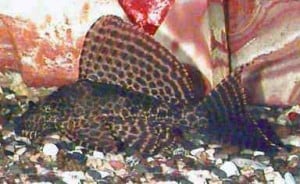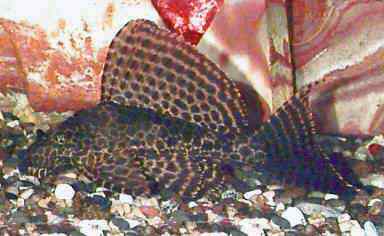
Common name: Leopard Plecostomus, Sailfin Plecostomus, Leopard Sailfin Plecostomus, L083, L165
Scientific name: Glyptoperichthys Gibbiceps, Pterygoplichthys Gibbiceps
Average Adult Fish Size: 20 inches / 51 cm!
Place of Origin: South America
Typical Tank setup: S. American biotope with rocks, driftwood, bogwood, caves and other hiding places. They do best if there is a current.
Recommended Minimum Aquarium Capacity: 30 gallon / 120 litre when small, and 120 gallon / 480 litre or larger when fully grown
Compatibility: Peaceful, but may fight with other plecostomus or catfish if not raised together or if there is not enough hiding places.
Temperature: 75 – 86 Deg. F / 24 – 30 Deg. C
Water chemistry: pH 6.5 – 7.7
Feeding: It is good algae eater when small, but gets progressively lazy as it gets larger. Algae wafers, spirulina based pellets and flakes, spinach leaves, lettuce, cucumber, zucchini, and green beans make up a good part of a healthy diet for this pleco with the occasional meaty treat of frozen brine shrimp, blood worms, and high protein pellets. Often shy when small, it is best to feed them just before turning the lights off for the night. Keep in mind that faster species might devour all the food and leave the slow pleco starving. Larger specimens become bolder and will eat at anytime. When it is up against the glass, make sure its’ belly looks full and rounded, not sunken and hollow.
Sexing: Venting is the only known way to sex this specie.
Breeding: Breeding is normally conducted in earthen caves along river banks in the wild. Commercial breeders use the same method, but in ponds. It would be difficult to duplicate this in an aquarium setting.
Additional Information: With a little work, this species can be hand tamed. They can easily live to be 20 years old or older. Frequent partial water changes, adequate filtration, and a varied diet are a must for long-term health. Larger specimens are easily caught bare handed instead of with a net. Watch out for the spines though! Will eat dead fish and the slime off of laterally flattened fish like discus and angelfish when they are sleeping. Bogwood or drift wood is a must in the Leopard Pleco aquarium.


Related Posts
Croaking Gourami – Trichopsis vittatus
Benthochromis Tricoti
Large-eyed Mouthbrooder – Callochromis Macrops